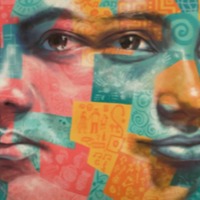
I lived in Kazakhstan in a big family of 12 children. We lived in poverty. We were even happy to drink water with bread. My mother worked at a grocery and earned little. My father drank all the time, and beat my younger sisters and brothers. My youngest brother, who is eight, collected bottles for money. It was a horrifying situation.
[I am] 18. A man came to my parents. He was about 47 years of age, not Russian. I had not known him before. He proposed work in a locality near Moscow. And he promised money to my father. After this conversation my father told me that I should go to these localities near Moscow to work. Nobody asked me [whether I wanted to go]. I had always dreamed to earn money myself, to buy clothes and help my family. This news made me happy. [The man] promised to pay much money.
[…]
To both of us for the fact that I would go to work.
[…]
[The man] said that he had agreed with my father and that I had to do nothing, just work and I would be paid. I did work. I worked not alone, but with three other girls there. We worked in two shifts. The first two or three days we worked as shop assistants. But we not only sold things, we also cleared up, washed dishes and floors and moved furniture. We were promised an apartment, but received none. We lived in an annex to the shop - it was like a storeroom, very dirty. There were mattresses on the floor. We were locked up there and they seldom brought food. Afterwards they began beating us, forcing us to work. Later, they took us to the home of this man. They were drinking there. They raped us and beat us.
No [they didn’t pay us]. Our bosses sold us for a night.
Yes [we worked for them as prostitutes]. They cut our skin and put out cigarettes on us.
I don’t know [why they cut us]. They did not explain.
Some girls fainted, and were on their backs for weeks. Once a girl made an attempt to run away. She was caught. We have not seen her any more. They threatened us that if we decided to run away, we would share the same fate. We were afraid of everything.
[…]
It lasted five months. Once they took us to weed potatoes. There were policemen not far away and I ran to them. They took me back to my bosses. I was told: “do not run away, you will be taken back in any case”. Everything was fixed by bribes. There was nobody to contact. Even the neighbours did not pay attention, saying “it’s not our business, settle it yourselves”.
[…]
Once some guests came around - it was a family celebration. They all drank and I run away at night. I alone managed to escape, the other girls had been locked up. They trusted me more. There was no way out, so I hadn’t tried anything. At night I ran away, a big lorry was standing there and I clung to it. Then the driver noticed me, and I told him everything. And that’s how I reached Omsk. I asked people at the market who live in Kazakhstan, they refused to help me, saying “only for money”. As I had no money, I found a job. At first I swept up, then began selling things at the market. I have saved money, and already collected a certain sum, but I need more, I have to work one more month, maybe more, to earn more money. Then they will take me to Kazakhstan for money.
I am afraid [to apply to any law-enforcement agencies]. I have no documents. I have nothing.
Yes. I am afraid [my parents are looking for me with the man], for that reason I did not contact the police.
*name given
Narrative credit to International Labour Organization
Original narrative found in report ‘Forced Labour in the Russian Federation Today: Irregular Migration and Trafficking in Human Beings’









